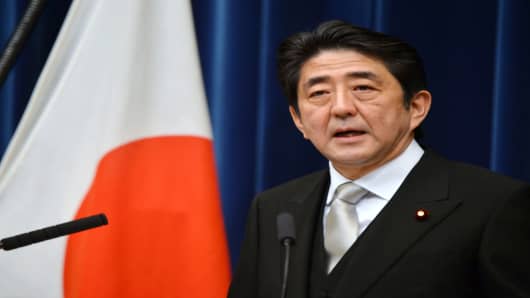Prime Minister Shinzo Abe said the Bank of Japan (BOJ) must set a 2 percent inflation target and make it a medium-term, not long-term, goal to show markets it was determined to pursue bold monetary easing to end nearly two decades of deflation.
The government is negotiating with the BOJ to issue a joint statement this month to make the central bank accountable for achieving 2 percent inflation, double its current price goal.
"The BOJ basically says it sees 1 percent inflation as a loose goal. That doesn't show it's responsible to achieve it and doesn't show its strong determination," Abe said told public broadcaster NHK on Sunday.
"The statement must say clearly that 2 percent is the target. That would lead to fundamental changes" in the way it guides policy, he said.
The BOJ set its current 1 percent inflation target last February and eased monetary policy five times in 2012.
Japan is stuck in its fourth recession since 2000 and its export-reliant economy is suffering from a strong yen.
Abe, who won a landslide election last December, has piled pressure on the BOJ for bolder efforts to beat deflation, threatening to revise a law guaranteeing its independence on monetary policy if his demands are not met.
(Read More: Abe Unveils Stimulus - Don't Get Too Excited)
Under intense pressure, the central bank will consider easing monetary policy at its rate review on Jan. 21-22 and respond to Abe's calls to double its inflation target, sources have told Reuters.
In the joint statement likely to be released on Jan. 22, the BOJ wants to describe the new target as a long-term goal without setting a specific deadline, to leave itself flexibility in guiding future monetary policy.
Abe, however, warned that making 2 percent inflation a "long-term goal" wasn't good enough. "That's too long. It should be a medium-term one. Otherwise markets won't react," he said.
The Council on Economic and Fiscal Policy, the government's top economic panel which the BOJ governor attends regularly, could call a meeting to focus on monetary policy and a timeframe, Abe said.
Abe also said he will meet with monetary policy experts on Tuesday, including his special economic adviser Koichi Hamada, to seek views on who would be suitable as next BOJ governor.
"Basically, I'd like to choose someone who can implement bold monetary policy and who shares our views," he said.
Abe's government has the power to nominate a successor to BOJ Governor Masaaki Shirakawa when his term expires in April, although the nomination needs approval by both houses of parliament. Abe controls the lower house but the upper house.
Japan last week approved a $117 bln stimulus package, the biggest spending boost since the financial crisis, to try and boost the economy. Abe is gambling that a shift to a more expansionary fiscal policy and more monetary easing from the central bank can end years of stop-start growth.


